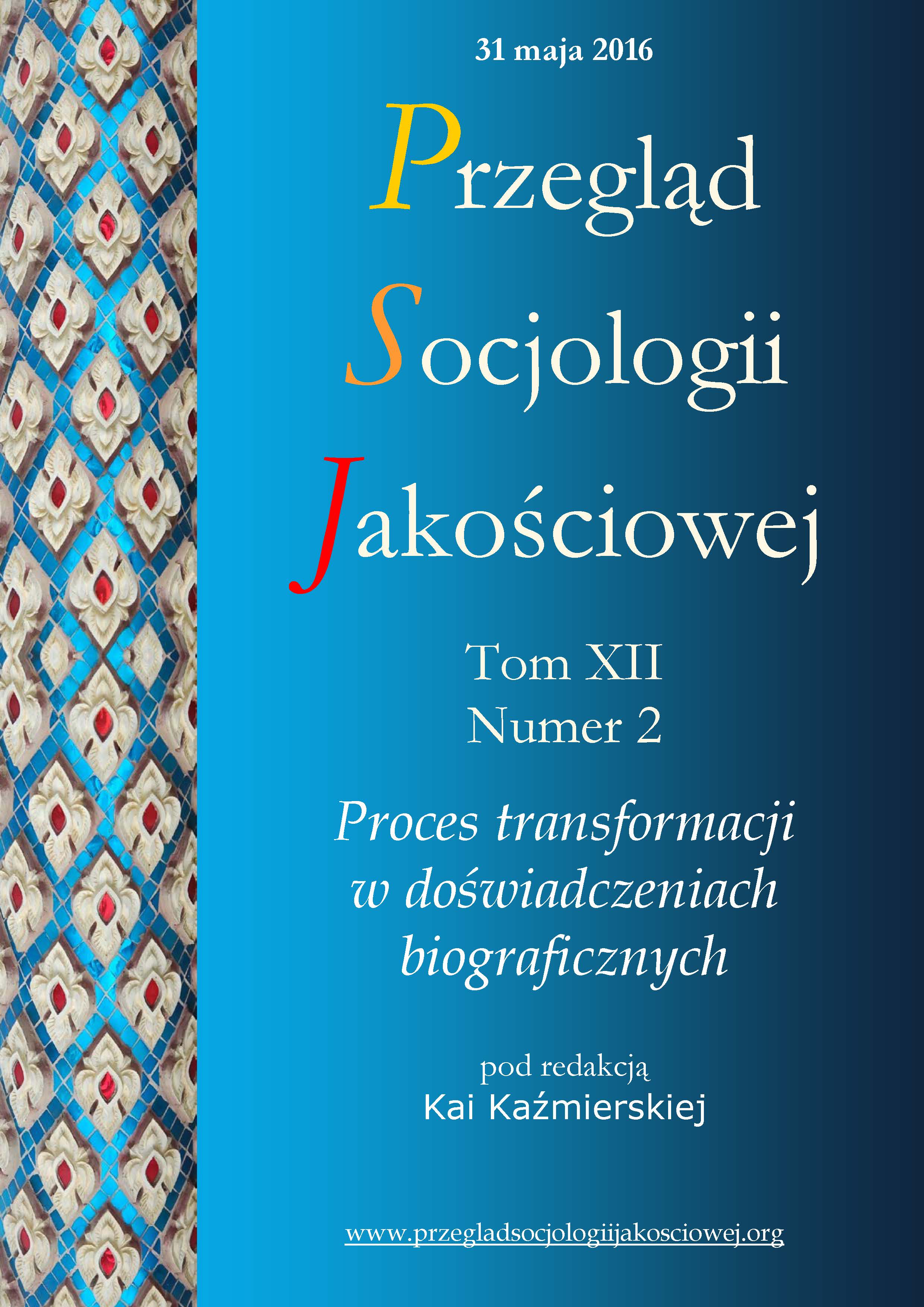Biographical Experiences of Post-Socialist Transformation in Corporate Business: Doing the Neoliberal Path
DOI:
https://doi.org/10.18778/1733-8069.12.2.04Keywords:
Post-Socialist Transformation, Biography, Biographical Work, Neoliberalism, Corporate BusinessAbstract
The neoliberal order, introduced in Poland in the course of post-socialist transformation, constituted a context of action, as well as a repertoire of rules and practices people becoming corporate managers had to learn to cope with. As some took it for granted as ‘the only’ way of joining the economies of the idealised ‘West’, and through their daily practices of efficiency and profit-maximisation, they were actually doing the neoliberalism; others, maintaining the distance towards the new world of ‘freedom and opportunity’ managed to develop a more critical stand. These were not actively doing neoliberalism, but merely making do with it, taking it strategically or even instrumentally. In the paper, the role of biographical work and biographical knowledge is analysed in the process of distancing, which enables monitoring and negotiations of the relations between the acting self and the neoliberal context of action.
Downloads
References
Apitzsch, Ursula and Irini Siouti. 2007. “Biographical Analysis as an Interdisciplinary Research Perspective in the Field of Migration Studies.” Frankfurt am Main: Research Integration, Johann Wolfgang Goethe Universität, University of York. Retrieved November 04, 2015 http://www.york.ac.uk/res/researchintegration/Integrative_Research_Methods/Apitzsch%20Biographical%20Analysis%20April%202007.pdf
Google Scholar
Balcerowicz, Leszek. 1995. Wolność i rozwój: Ekonomia wolnego rynku [Freedom and Development: Free Market Economy]. Kraków: Wydawnictwo Znak.
Google Scholar
Bourdieu, Pierre. 1977. Outline of a Theory of Practice. Cambridge: Cambridge University Press.
Google Scholar
DOI: https://doi.org/10.1017/CBO9780511812507
Buchowski, Michał. 2013. “Neoliberalizm w Europie Środkowej – magia, religia czy nauka”? [Neoliberalism in Central Europe: Is It Magic, Religion, or Science?]. Poznańskie Studia Slawistyczne [Poznań Slavic Studies] 4:29-41.
Google Scholar
DOI: https://doi.org/10.14746/pss.2013.4.2
Bugaj, Ryszard. 2015. Plusy dodatnie i ujemne, czyli polski kapitalizm bez solidarności [Pros and Cons or Polish Capitalism Without Solidarity]. Warszawa: Poltext.
Google Scholar
Dunn, Elizabeth C. 2004. Privatizing Poland: Baby Food, Big Business, and the Remaking of Labor. Ithaca, NY: Cornell University Press. [Polish edition: Dunn, Elizabeth C. 2008. Prywatyzując Polskę. O bobofrutach, wielkim biznesie i restrukturyzacji pracy. Warszawa: Wydawnictwo Krytyki Politycznej].
Google Scholar
Eyal, Gil, Iván Szelényi, and Eleanor Townsley. 1998. Making Capitalism Without Capitalists. The New Ruling Elites in Eastern Europe. London, New York: Verso.
Google Scholar
Hardy, Jane. 2009. Poland’s New Capitalism. London, New York: Pluto Press.
Google Scholar
Kaźmierska, Kaja, Andrzej Piotrowski, and Katarzyna Waniek. 2012. “Transnational Work in the Biographical Experiences of Traditional Professions and Corporate Executives: Analysis of Two Cases.” Pp. 76-101 in The Evolution of European Identities: Biographical Approaches, edited by R. Miller and G. Day. Basingstoke, New York: Palgrave Macmillan.
Google Scholar
DOI: https://doi.org/10.1057/9781137009272_5
Kieżun, Witold. 2013. Patologia transformacji ( wydanie u zupełnione) [Pathology of Transformation]. Warszawa: Poltext.
Google Scholar
Kohli, Martin. 1981. “Biography: account, text, method” Pp. 61-75 in Biography and Society. The Life History Approach in the Social Sciences, edited by D. Bertaux. London: SAGE Studies in International Sociology.
Google Scholar
Kostera, Monika. 1995. “The Modern Crusade: The Missionaries of Management Come to Eastern Europe.” Management Learning 26:331-352.
Google Scholar
DOI: https://doi.org/10.1177/1350507695263004
Kowalik, Tadeusz. 2009. www.POLSKATRANSFORMACJA.pl [Polish Transformation]. Warszawa: Warszawskie Wydawnictwo Literackie.
Google Scholar
Kowalik, Tadeusz. 2011. “Państwo i sprawiedliwość” [State and Justice]. Nowy Obywatel 1/2011. Retrieved November 05, 2015 http://nowyobywatel.pl/2011/01/27/panstwo-i-sprawiedliwosc/
Google Scholar
Król, Marcin. 2015. Byliśmy głupi [We Were Stupid]. Warszawa: Wydawnictwo Czerwone i Czarne.
Google Scholar
Moskalewicz, Marcin. 2014. “Wolność. Ratuj się, kto może!” [Freedom. Run for your life!]. Pp. 61-75 in Słodko-gorzki smak wolności: Młodzi intelektualiści o 25 latach przemian w Polsce [Bitter-Sweet Taste of Freedom: Young Intellectuals Discuss 25 Years of Changes in Poland], edited by M. Król. Warszawa: Instytut Spraw Publicznych.
Google Scholar
Ost, David. 2005. The Defeat of Solidarity. Anger and Politics in Postcommunist Europe. Ithaca, NY: Cornell University Press.
Google Scholar
DOI: https://doi.org/10.7591/9781501729270
Ost, David. 2008. “Wstęp [Introduction].” Pp. 5-12 in Prywatyzując Polskę. O bobofrutach, wielkim biznesie i restrukturyzacji pracy, edited by E. C. Dunn. Warszawa: Wydawnictwo Krytyki Politycznej.
Google Scholar
Riemann, Gerhard and Fritz Schütze. 1991. “‘Trajectory’ as a basic theoretical concept for analyzing suffering and disorderly social processes” Pp. 333-357 in Social Organisation and Social Process. Essays in Honor of Anselm Strauss, edited by D.R. Maines. New York: Walter de Gruyer.
Google Scholar
Schütze, Fritz. 1992. “Pressure and Guilt: War Experiences of a Young German Soldier and Their Biographical Implications.” International Sociology 7(2-3):187-208.
Google Scholar
DOI: https://doi.org/10.1177/026858092007002005
Schütze, Fritz. 2008. “Biography Analysis on the Empirical Base of Autobiographical Narratives: How to Analyze Autobiographical Narrative Interviews – Part One and Two.” European Studies on Inequalities and Social Cohesion 1/2:153-242, 243-298; 3/4:6-77.
Google Scholar
Shields, Stuart. 2008. “How the East Was Won: Transnational Social Forces and the Neoliberalisation of Poland’s Post-Communist Transition.” Global Society 22(4):445-468.
Google Scholar
DOI: https://doi.org/10.1080/13600820802366409
Sowa, Jan. 2015. Inna Rzeczpospolita jest możliwa! Widma przeszłości, wizje przyszłości [A Different Poland Is Possible! The Spectra of Past, the Visions of Future]. Warszawa: Wydawnictwo W.A.B.
Google Scholar
Stark, David and László Bruszt. 2001. “One Way or Multiple Paths: For a Comparative Sociology of East European Capitalism.” American Journal of Sociology 106(4):1129-1137.
Google Scholar
DOI: https://doi.org/10.1086/320301
Steger, Manfred B. and Ravi K. Roy. 2010. Neoliberalism: A Very Short Introduction. Oxford, New York: Oxford University Press.
Google Scholar
DOI: https://doi.org/10.1093/actrade/9780199560516.001.0001
Strauss, Anselm. 1993. Continual Permutations of Action. New York: Aldine de Gruyter
Google Scholar
Szacki, Jerzy. 1995. Liberalism After Communism. Budapest: Central European University Press.
Google Scholar
Sztompka, Piotr. 1993. “Civilizational Incompetence: The Trap of Post-Communist Societies.” Zeitschrift für Soziologie 22(2):85-95.
Google Scholar
DOI: https://doi.org/10.1515/zfsoz-1993-0201
Downloads
Published
How to Cite
Issue
Section
License

This work is licensed under a Creative Commons Attribution-NonCommercial-NoDerivatives 4.0 International License.














